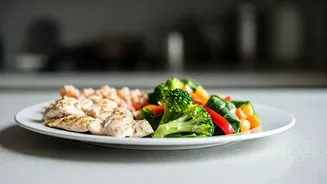Iron's Importance
Iron plays a vital role in numerous bodily functions, including oxygen transport and energy production. A deficiency can lead to fatigue, weakness, and other
health issues. Incorporating iron-rich foods is essential for maintaining optimal health. The human body relies on iron to carry oxygen in red blood cells, which is important for energy production. Iron deficiency is a widespread problem, causing fatigue and reducing overall vitality. The benefits of consuming iron-rich vegetables extend beyond their mineral content, including an array of vitamins and antioxidants.
Leafy Greens Abound
Leafy green vegetables stand out as excellent sources of iron. Spinach is a well-known iron provider, and it’s very versatile. Other options include kale and collard greens, which offer additional vitamins and fiber. These greens not only enhance iron intake but also provide essential nutrients for overall health. These vegetables can be easily included in your diet through salads, smoothies, or cooked dishes. Regularly consuming leafy greens can help prevent iron deficiency. These versatile ingredients make it easier to support optimal health through varied and delicious meal options.
Beans and Legumes
Beans and legumes are valuable plant-based sources of iron. Lentils, kidney beans, and chickpeas are particularly noteworthy, offering substantial iron content and beneficial fiber. They are also rich in protein, making them a great addition to vegetarian and vegan diets. Including beans and legumes in meals can help meet daily iron requirements and promote digestive health. These foods are versatile and can be used in various dishes, such as soups, stews, and salads. They're a great choice for those seeking nutritious and filling meals. Their combination of iron, protein, and fiber contributes to overall wellness.
Other Vegetable Options
Besides leafy greens and beans, other vegetables offer iron. Potatoes, especially those with the skin, contribute to your iron intake. Mushrooms and asparagus are also valuable options. Including a variety of vegetables in your diet can ensure a diverse range of nutrients. These foods, when included in your diet, can help maintain iron levels, and they bring a variety of vitamins. They add flavor and texture to your meals, making it easier to stick to a balanced diet. These vegetables are both delicious and good for you, with a wide range of culinary uses.
Boosting Iron Absorption
Enhancing iron absorption is crucial for optimal benefits. Vitamin C enhances the absorption of iron from plant sources. Pairing iron-rich foods with vitamin C-rich options, such as citrus fruits or bell peppers, is an effective strategy. This helps the body make the most of the iron you consume. This can significantly improve your iron levels. Incorporating vitamin C rich foods into your meals enhances the effectiveness of the iron you consume. This simple combination can have a substantial positive effect on your health.
Incorporating Vegetables
Integrating iron-rich vegetables into your daily diet is easy. Create a variety of meals to prevent nutritional monotony. Try adding spinach to your morning smoothie, and include lentils in your salads at lunch. Consider incorporating beans and mushrooms into your dinner. Experimenting with diverse recipes can make healthy eating enjoyable. By making iron-rich vegetables part of your regular meals, you can maintain a healthy iron balance. It helps with overall well-being. Making small changes can lead to big improvements in your health.
















